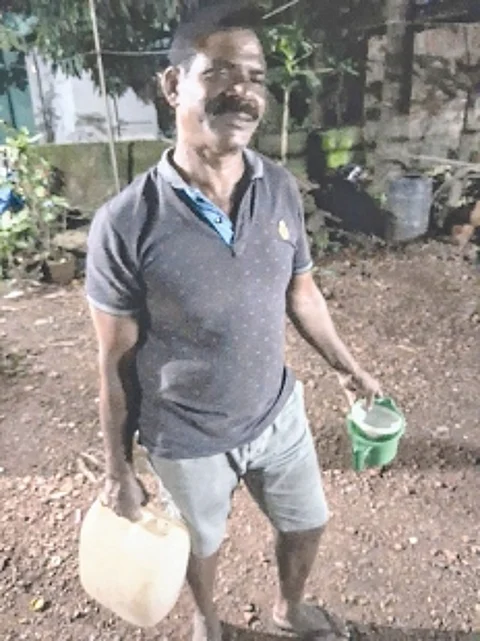

CUNCOLIM: In the old days, Cuncolim was renowned for its fertile land, and the farmers, belonging to the Kshatriya community, were deeply engaged in agricultural activities. Along the banks of their agricultural plots, they nurtured lush coconut groves. The landscape was adorned with grand palm farms owned by landlords and the Agriccola dos Gunkari de Cuncolim e Veroda Society. This is when toddy tapper families or ‘renders’ from neighbouring villages migrated to Cuncolim.
During both the Portuguese colonial era and India’s post-independence period, fresh toddy was in great demand, as well as the local fermented liquor known as ‘Mada soro’. During those times, the sale of foreign-made liquor was limited. Moreover, toddy was not only consumed as a beverage but was also used to prepare vinegar and staples like sanna.
These toddy tapper families who had settled in Cuncolim established their ‘Bhati’, the liquor extraction cottage industry. Many of these toddy tappers made homes in wards like Salemando, Woddi, and Bhatyem. For many years, right up until recently, toddy extraction was at its peak. However, the preference has now shifted from local beverages to more expensive foreign-made liquor.
Today, local ‘maddacho soro’ is primarily reserved for medicinal purposes or enjoyed only occasionally. As the demand for toddy declined, these toddy tappers transitioned to other, more viable sources of income.
However, some traditional toddy tappers continued to practice their ancestral occupation, undeterred by changing times, and one such stalwart is Earnesto Fernandes. He began climbing coconut trees at the tender age of ten and started extracting toddy when he was just fifteen. Since then, Earnesto has remained dedicated to this age-old profession. At some point, he ventured to work in the Gulf to earn a living, but his passion for his ancestral occupation eventually brought him back to his roots.
Earnesto recounts a harrowing incident from his life, saying, ‘Maad Rendrak kennach trasat udoyna. Maad rendracho isht’, which translates to, “The coconut tree is a friend of the toddy tapper; it will never put the toddy tapper in trouble, or harm him."
He had a near-fatal fall at the age of fifteen, breaking his bones but miraculously surviving. Years later, he experienced a second, even more perilous fall. Recently, he narrowly escaped a third fall. Presently, his bones are still healing after these falls, and he may not climb coconut trees with the same vigour, but he remains confident that he will ascend to great heights once again to extract toddy.
Earnesto learned this skill from his father, and it’s a tradition passed down through generations. He may be the last of his kind, battling for the survival of this traditional occupation. The next generation seems uninterested, and this occupation is on the brink of extinction in Goa. As Earnesto puts it, “It’s history as a traditional occupation is history; only the caste remains.” Earnesto, a man of faith, asserts that if given a second chance at life, he would choose the same occupation and live as a render, ultimately passing away in the role that defines his heritage.